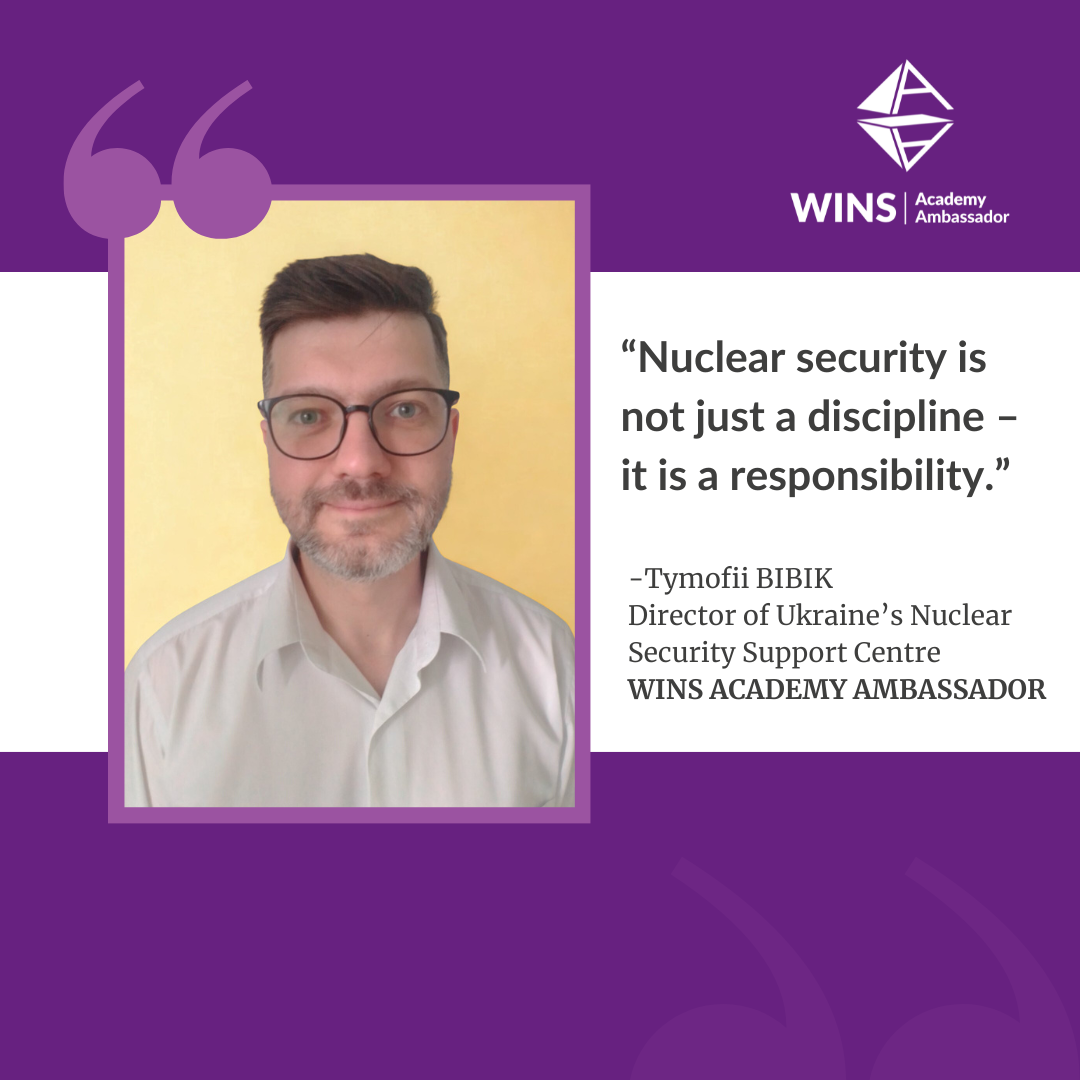Tymofii Bibik is an Associate Professor at the National Technical University of Ukraine «Igor Sikorsky Kyiv Polytechnic Institute» and Director of the Nuclear Security Support Centre. With a strong background in nuclear engineering, practical experience at nuclear facilities, and a deep commitment to education and international collaboration, Tymofii has recently taken on the role of WINS Academy Ambassador.
In this interview, he reflects on the path that led him into the nuclear field, the motivations behind his engagement with WINS, and the critical importance of academic institutions in strengthening nuclear security worldwide. He also shares insights into the challenges facing Ukraine and the international community, the value of global cooperation, and his message for the next generation of nuclear professionals.
What inspired you to pursue a path related to nuclear science or security?
From the very beginning of my academic journey, I was inspired by the unique combination of advanced engineering, responsibility, and societal importance that defines the nuclear field. Working directly at a nuclear power plant early in my career strengthened my understanding of how essential nuclear safety and security are for the wellbeing of people, the resilience of critical infrastructure, and the energy independence of a country.
Over time, I realised that contributing to nuclear security – through research, education, and international collaboration – allows me to make a meaningful impact not only within my institution, but also on the broader global community.
How did you first learn about WINS and its mission? What motivated you to become a WINS Academy Ambassador?
I first learned about WINS through its cooperation with academic and technical institutions involved in nuclear security education. The organisation’s focus on professional development, knowledge transfer, and building a global culture of security resonated strongly with my own work at Kyiv Polytechnic Institute.
Becoming a WINS Academy Ambassador is a natural step for me because it offers a platform to expand the reach of nuclear security education, promote modern, competency-based training, and build stronger international connections. I want to help ensure that both current and future professionals understand not only the technical aspects of nuclear security, but also the values, behaviours, and attitudes that form its foundation.
“Contributing to nuclear security – through research, education, and international collaboration – allows me to make a meaningful impact not only within my institution, but also on the broader global community.”
Why is it important for academic institutions to engage more deeply in nuclear security education and awareness?
Academic institutions shape future professionals. If nuclear security is not integrated meaningfully into university programmes, the industry risks having specialists who are technically strong but lack comprehensive awareness of modern threats, human factors, and emerging global challenges.
Universities also serve as neutral platforms for research, dialogue, and innovation. By engaging deeply in nuclear security education, they contribute to building a strong national and international culture of security, reducing risks, and promoting responsible use of nuclear technologies.
Finally, academia is where interdisciplinary thinking grows, which is essential for addressing complex security issues.
In your view, what are the key nuclear security challenges facing Ukraine and the broader international community today?
Ukraine faces a unique combination of challenges due to ongoing military conflict. These include:
- Ensuring the physical protection of nuclear facilities under conflict conditions
- Strengthening resilience against sabotage, cyber threats, and disruptions to critical infrastructure
- Maintaining a high-performing security culture despite stress factors and unpredictable external risks
For the international community, important challenges include:
- Adapting nuclear security frameworks to evolving geopolitical risks
- Addressing emerging technologies and hybrid threats
- Ensuring consistent competency development and knowledge transfer as the global workforce changes
- Strengthening international cooperation to prevent nuclear and radiological materials from becoming targets or tools in conflict
“Nuclear security is not just a discipline – it is a responsibility.”
Have you seen positive examples of academic collaboration or international engagement that advanced nuclear security in practical ways?
Yes. Over the past years, I have seen many examples where collaboration produced tangible results. Joint educational projects with international partners, participation in IAEA programmes, and cooperation with institutions such as Sandia National Laboratories or WINS have helped to strengthen nuclear security competencies among students and professionals.
These collaborations bring modern methodologies, scenario-based training, and international best practices directly into the classroom. They also motivate students by showing them that nuclear security is a dynamic, global field where their contributions truly matter.
What message would you share with the next generation of nuclear professionals in Ukraine and beyond?
My message is simple: nuclear security is not just a discipline – it is a responsibility.
Regardless of what role you choose, your work contributes to protecting people, the environment, and the peaceful use of nuclear technologies. Stay curious, stay committed to learning, and do not hesitate to engage internationally.
The challenges are significant, but so is the impact you can make. The future of nuclear security will depend on your professionalism, your integrity, and your ability to work across disciplines and borders.
